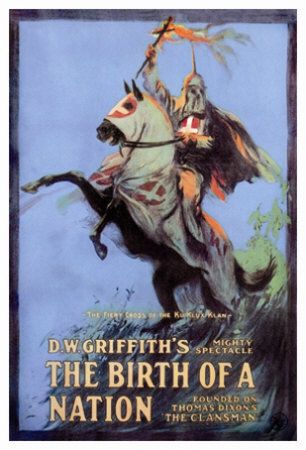The Birth of a Nation (1915)

Epoch Producing Co.
Director: D.W. Griffith
Honors: National Film Registry
There is nothing like stirring up a little controversy. How does one of the most controversial films in American history be known as possibly one of film history's most important? Well it takes a visionary named D.W. Griffith and an America that was just 50 years removed from the bloodiest war in it's history, the Civil War.
Griffith, a son of a Confederate colonel, found the play/novel entitled The Clansman and made it into what could be seen as the first epic film in history. A three hour and ten minute film, broken into two parts, with an intermission, and was given it's own written score to be played by a large live orchestra . (Keep in mind, silent films where played in small rooms with a few dozen seats with a simple piano player at that time.) This film was meant to be epic in every sense. This film was to stir the hearts of its audience as everything about it was to be larger than life. Watching this film was meant to be an event.
Now the controversy. The story depicts the Civil War and the Reconstruction of the United States, especially the South, as a beaten and bloodied America tries to find its true identity. The story follows two families, one Northern and one Southern, as they endure the war, loss of loved ones, and the discovery of new love, as members of the two families end up marrying each other, but not before the rise of the newly free blacks in the South, who are heroically defeated by the glorious and honorable... (wait for it)... Klu Klux Klan. (There we go.) That is right. This film holds the KKK as the heroic saviors of a tattered and torn country, depicting blacks as beasts that were so drunk on their new found free power that they held over white Southerns, making them enable to vote in elections and chase after the white women like animals. (Roll eyes here.) The film glorifies the actions of the Klan as they run down and kill freed slaves and praise them as the guiding force that brings American back together and on into the future as a peaceful nation. And upon that the picture ends with a heavenly shot of Jesus Christ overseeing this birth of this new peaceful nation.
Okay, we can clearly see why this film causes so much controversy, but what made this movie so successful? Well it's shear size is one. It was a motion picture spectacle. The then President Wilson was quoted as calling the picture "...like writing history with lightning" which was used highly in the film publicity. (Wilson's quote is highly debatable as there are claims that the film's author created the quote and Wilson would later deny he made them.) But most of all it was a different America. An America where African American's where still treated very poorly, and the Civil War was still fresh in many people's minds. This film gave the people a hero, the wrong hero, but a hero that united a heavily white audience. I am not defending the movie and its views at all, and can never understand fully how people rallied behind it, but I do know that it was the highest grossing movie of its time, so people where drawn to it.
What I do know that was truly monumental about the picture was it's innovative camera techniques and narrative skill when it came to presenting a movie to the next generation of moviegoers. Griffith in a way is known at the father of what would be modern filmmaking. He was the director that heavily used close ups when most films were shown in wide shots. He would widely use cross-cuts when most films showed long continuous shots. His techniques would usher in editing as a artful craft. Instead of films being more or less recorded plays with long continuous shots as a scene. Griffith would shoot scene with different elements and edit them together to to form a complete scene that guided the audience exactly where he wanted them to go. Griffith was a visionary when it came to the filmmaking process. His innovations and size of production would open the doors to future steps in film. That is what made the movie special then and now. Its views are a whole other mess to talk about, but as a film, the picture is held in high regard by film historians.
Griffith would make millions for his picture, but would also fight masses of people who brought with them an uproar and banned the film in many cities. Griffith giving into the large number of people he made upset would go on to make another picture that was an "I'm sorry" note to the world. It's title ironically would be called Intolerance. (insert giggles)

.jpg)
Comments
Post a Comment